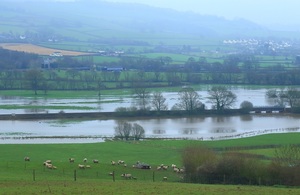Flood-hit farmers can now apply to £6 million fund
News story
The latest application round of the Farming Recovery Fund is now open to eligible farmers to apply for grants to help them recover from February floods.

A £6 million fund to support farmers seriously affected by February’s floods has opened for applications today (Thursday 18 June).
Eligible farmers and land owners in parts of Herefordshire, Shropshire, Worcestershire, Gloucestershire, Staffordshire, Nottinghamshire and North and East Yorkshire can apply for between £500 and £25,000 under the Farming Recovery Fund to support their recovery efforts.
These grants follow earlier rounds of funding for those affected in the July 2019 and November 2019 floods, bringing the total pot of funding to £10 million.
The Rural Payments Agency has introduced a simplified online portal for the latest round of applications to make it easier for farmers to apply.
The government has also provided a derogation from the crop diversification requirement, which would have required farmers managing more than 10 ha of arable land to grow at least two different crops, and those with more than 30 hectares to grow at least three, in order to receive the BPS greening payment for 2020. This relaxation was made to help ensure those farmers who were not able to plant spring crops would not be unfairly penalised.
Chief Executive of the RPA Paul Caldwell said:
We know the flooding in February had a devastating impact on farming communities across the North and Midlands.
The RPA has been working hard to ensure farmers feel supported during this time and from today eligible farmers will be able to access the £6 million fund to help them get back on their feet.
Our new online portal will make it easier for farmers and landowners to submit an application and we’ve also given farmers an extra month this year to apply for their BPS payment.
Farmers in affected areas who suffered from flooding in February are being encouraged to check GOV.UK and read the handbook to see if they are eligible to apply for a grant to pay for uninsurable damage caused by the flooding. This could include removing debris or re-cultivation of grassland or arable land.
Further guidance on how to submit applications can be found here.
Published 18 June 2020
